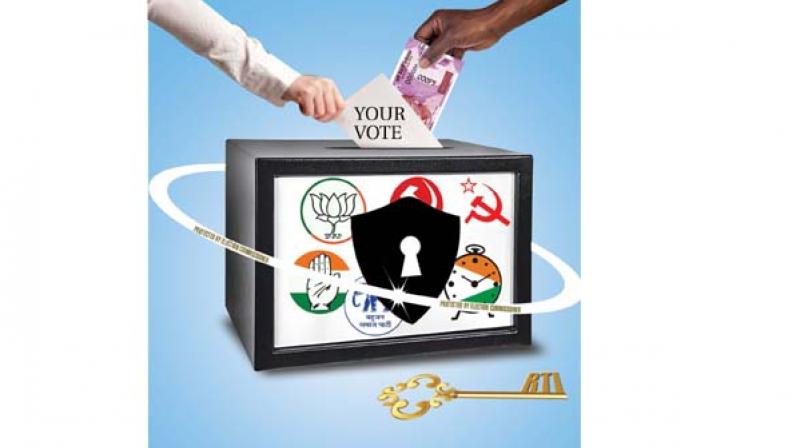Political party is public authority

The question whether political parties come under the purview of the Right to Information Act (RTI) has been raised several times in the past. The Election Commission of India has recently said that they do not. However, that is not the end of the debate. This question will continue to come up. Interestingly, the Central Information Commission seems to be of the view that political parties cannot be excluded from RTI.
The basic objective of RTI is to ‘promote transparency and accountability in the working of every public authority’ and for that purpose to put in place a regime of right to information for citizens. Right to information enriches the content of democracy by providing a very valuable right to the citizens of the Republic to access information on every activity of a public authority. The Act defines information in the widest possible term and the definition of ‘public authority’ emb-races not only all authorities under the Constitution and law, but also non-governmental organisations substantially financed by the government. This definition makes it clear that the focus of this Act is not merely on governmental authorities, but also on private bodies that receive ‘substantial’ amount of money from the government. Thus, the scheme of RTI is to enable the citizens to secure the widest range of information.
When we consider the question whether political parties come under the purview of RTI, the objective and purpose of this legislation mentioned above become important factors. A political party is an association of individual citizens registered as a political party by the Election Commission of India under Section 29 A of the Representation of People Act, 1951 (RP Act). This laconic definition in the RP Act does not reveal the actual role or functions of a political party in our democratic system.
Political parties are in fact the kingpins of the democratic system. Party less democracy, a concept toyed with by political leaders in the early years of our Republic is only a pipe dream. It cannot work on the ground. Thus, even though the Indian Constitution originally did not mention political party, the 10th Schedule which was added later recognises it and provides for the stability of party system.
Now, let us try to clearly understand the position of political parties in our democracy. Even though these are private, non-governmental bodies, they provide elected representatives to the legislative bodies like Parliament and State Assemblies. These representatives form governments that rule the country. Thus, the political parties in reality provide governments that implement their policies and programmes. So, the political parties are not mere associations of citizens or non-governmental bodies performing non-governmental functions. By participating in elections and thereafter forming governments, the political parties are performing a vital public function. No ordinary association or body performs Constitutional and statutory functions like providing MLAs and forming governments. This makes political parties fundamentally different from ordinary non-governmental bodies. Therefore, it is only logical that a political party, though not a public authority under the definition in the RTI Act, should be trea
ted as a deemed public authority for the purpose of this Act.
Let us now consider another point. Under Section 29B of the RP Act, 1951, a political party can accept any amount of voluntary contribution from a person or company other than a government company. The political parties were prohibited from accepting contributions from foreign sources under the Foreign Contribution (Regulation) Act, 2010 which has now been changed. Now they can accept any amount from a foreign source. Section 29C of the RP Act, 1951 requires political parties to report to the Election Commission every year the total amount received, the names and addresses of the donors etc. The most important point about this contribution to political parties is that it is exempt from the income-tax. Section 13 A of the Income Tax Act, 1961 says that an “income by way of voluntary contributions received by a political party from a person shall not be included in the total income of such political party.”
Two things stand out from what is stated above. One, a political party can receive unlimited amount of money from an individual or a company within the country or a foreign source. Two, it does not have to pay any income-tax. All that is required by the law is to submit a report to the Election Commission and the annual return under Section 139 of the Income-Tax Act, 1961. However, in the case of recently released electoral bonds, even that legal formality is not required to be fulfilled.
So, the crucial point is that the government by exempting the entire political contributions received by political parties from income tax is foregoing substantial revenue. Is it not a substantial indirect funding of a non-governmental organisation? Section 2 (h) (d) (ii) says that a non-government organisation which is directly or indirectly substantially founded by the government is a public authority. Well, the lawmakers might not have had political parties in mind when this clause was enacted. But, then political parties are not simple non- governmental organisations. These are constitutionally recognised bodies. Their functions like setting up the candidates for election, forming the government on getting a majority, etc, make them a part of the Constitutional set up. The exemption of the entire income of a political party from contribution signifies the recognition by the lawmakers that the state needs to provide them funds either directly or indirectly. Income-tax exemption, in this context is an indirect funding. For this reason too, the political parties should be deemed to be coming within the purview of the RTI Act.
(The author is former secretary general, Lok Sabha)

